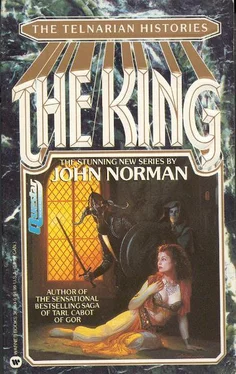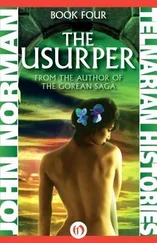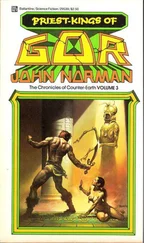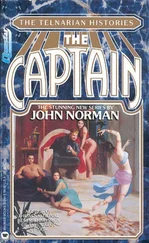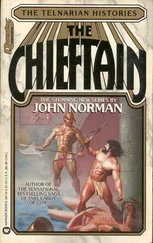The King
(The Telnarian Histories, Book 3)
by John Norman
This book is dedicated
to all who approve of, and welcome, and celebrate,
the liberty and glory
of the human imagination.
“And there were wolves in the land.”
-The Annals
“Let us laugh with steel.”
-An Otung Saying
“Let us see if there are men here.”
-A Drisriak Challenge
“The laurel is unpicked; We have forgotten the festivals; The laurel is unpicked; The statues are broken; The limbs of the gods lie in the dust; The holy places are defiled; The temples are in ruins. The laurel is unpicked; It has died upon the branch; The tree is dead; It is winter; It grows cold. Night has fallen upon the empire.”
-Alarion
“I have heard the drums; I have seen the riders on the hill; The breath of their horses is like fire; Their hoofs are like thunder; On their arms the sun blazes; The lords have come; I will come forth from the forest; I will plant again; I will find a wife; It is a new morning.”
-Anonymous, after Alarion
Note:
It has been the custom of the chronicler, or chroniclers, as the case may be, and as some have argued, to include certain observations, or reflections, in a manner prefatory to the Telnarian manuscripts. Here, however, we seem to encounter a departure from that practice. We have only these three quotations, and the two short poems. I do not understand them, or, at any rate, their placement here. Their inclusion with the manuscript may be the result of some accident, or mistake. This sometimes happens with complex papers. Certainly they seem, the poems at least, to have little to do with the story. I have included them, however, as they were with the manuscript.
-Editor
“Let us see if there are men here,” said Abrogastes. He handed the empty drinking horn to a shieldsman. He wiped his face with the back of his right forearm.
Retainers, and clients, pounded on the long tables lining the edges of the hall.
Drinking vessels were brought hastily by former ladies of the empire.
The drinking horn, refilled, was handed to Abrogastes by his shieldsman.
Abrogastes, seated on the bench, between the tall, carved high-seat pillars, looked down from the dais, on the hall, and the tables, grasping the drinking horn, formed from the horn of the hoofed sorit , adorned, enwrapped, with golden filigree, foaming with bror , spiced and honeyed, brewed from golden lee .
This was the season of the storms, of the rain of stones between the world of the Alemanni and its yellow star.
The lionships slept in their steel sheds.
In the season of the storms was sealed the world of the Alemanni, the stones in their annual tides, streaming in the skies, some visible at night, closing the gates of the world, closing it to those without, locking within, as well, those on its surface.
But in the spring the skies would clear.
It was then that the lionships would awaken.
Abrogastes was moody of late.
He stared sullenly into the drinking horn.
Bror was on his beard.
Behind him, to his left, his shieldsman carried his sword. On the bench beside him, at his right, lay an imperial pistol. It was a simple, yet precious weapon. In the empire, only one of senatorial rank, or above, would be likely to possess such a weapon, or a limited number of charges for it, privately. In billions of years, you see, resources which once seemed inexhaustible proved themselves finite, after all, and often unrenewable.
In many places even imperial troops were armed with simple weapons. A parity, thus, had developed in many places between the empire and its encroaching foes, and foes not unoften, former federates , within its own borders. The advantages of the imperial troops on many worlds lay sometimes in little more than military engineering, discipline, and tactics. Acres of land, or a woman, had often been exchanged for no more than an ancient bullet. Yet there was no doubt as to the strength of the empire yet, an empire concerned to husband its resources, and resist tenaciously incursions into its central systems. It could still destroy worlds. Yet there were many worlds and once one was destroyed, the energy, the means, to destroy such a world no longer existed. That bullet, so to speak, had been fired.
There was the sound of slim, belled ankles, as former ladies of the empire, bearing great wooden trenchers, hurried barefoot over the dirt, rush-strewn floor to serve the guests, the clients, the retinue, the men at arms, the high men, the ambassadors, the merchants, the scholars, the sons of chieftains in fosterage, the hostages, seated beneath the high-roofed hall of Abrogastes, lord of the Drisriaks, largest and fiercest of the eleven tribes of the Alemanni nation, that nation referred to commonly in imperial records as the Aatii.
Abrogastes handed his drinking horn, emptied, to his shieldsman, who laid it to one side.
Such a horn must be drained before it can be put down.
This is common among the Alemanni, the Vandals, and other such nations.
The former ladies of the empire hurried about. The switches of lads in attendance, here and there, in colorful garments, in colorful cloaks, a livery of sorts, would brook neither delays nor dallyings on the part of the beauties.
Abrogastes seemed angry.
He was often so, of course, when the sword, his signet on the pommel, for signing deeds, was not in his hand, when he was not aflight, when he was not adventuring.
Yet Abrogastes was not a simple adventurer, no ordinary raider, no simple brigand or pirate, sniffing about here and there, watching for his chance, prowling at the outskirts of cities, then slipping into a port at night, bringing the storm of fire and steel to some town, and then slipping away again, almost as swiftly as he had come, before the imperial cruisers could, or would, reach the scene.
Some worlds, he was sure, had been abandoned to the predations of such as he, as they lay open and inviting, whereas others, doubtless richer, were zealously guarded, so much so that they might cost a fleet.
Was this supposed to constitute an unspoken contract, he had wondered, a concession of sorts, that he might occupy himself somewhere, and content himself with what he was offered?
That he should then give up the rest?
Did they think to cast him a bone, that he might carry it away, and gnaw on it, and worry it, thereby being distracted from the stores of roasted beeves, the scent of which was on every wind?
Did they think he was a dog, to be so easily distracted?
Those of the empire, he knew, regarded him, and his kind, as dogs.
But they did not know the dogs of the Alemanni, he thought to himself, one of which lay to his right, on the dais, humped, alert, its crest half-aroused, watching the tables between half-closed lids.
The dogs of the Alemanni, and of many worlds, were large, agile, restless, vicious beasts.
Dogs, mused Abrogastes, have teeth, and will.
With some worlds, still nominally within the empire, many of which on whom federates were housed, he had formed arrangements. On many of these worlds citizens still sacrificed to the empire on the public altars, whereas resources, and tributes, secured their impunity from incursions. These became, in effect, tacit client states of the Alemanni. They increased the power of the Alemanni, and, indeed, of other peoples who were engaged in similar projects, enterprises of an economic and political nature. Imperial insignia, and standards, continued in such places to dignify public buildings, theaters and such, whereas, in justice, a banner of pelts, flown from a pole in a field, or mounted on a great wagon, might have been more appropriate.
Читать дальше
